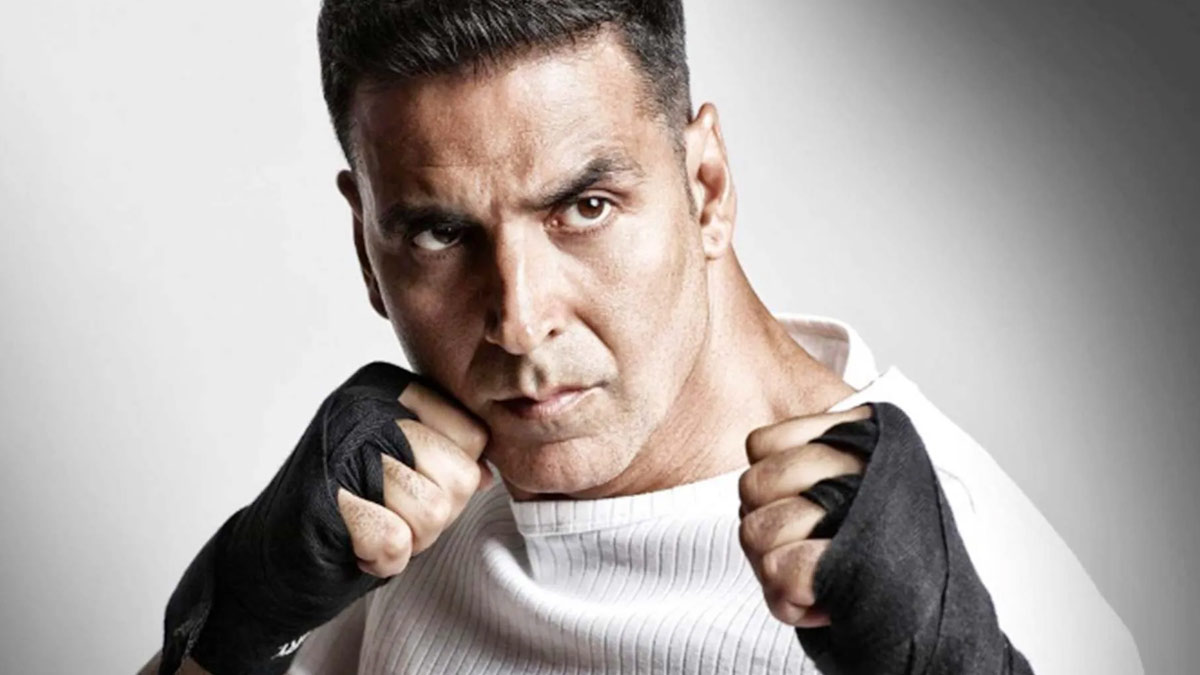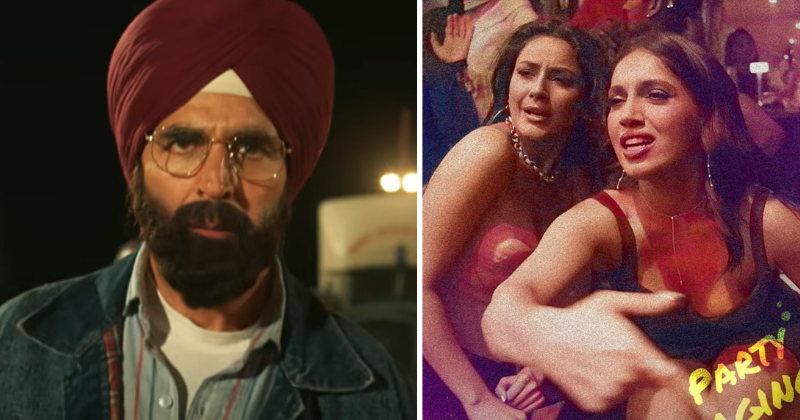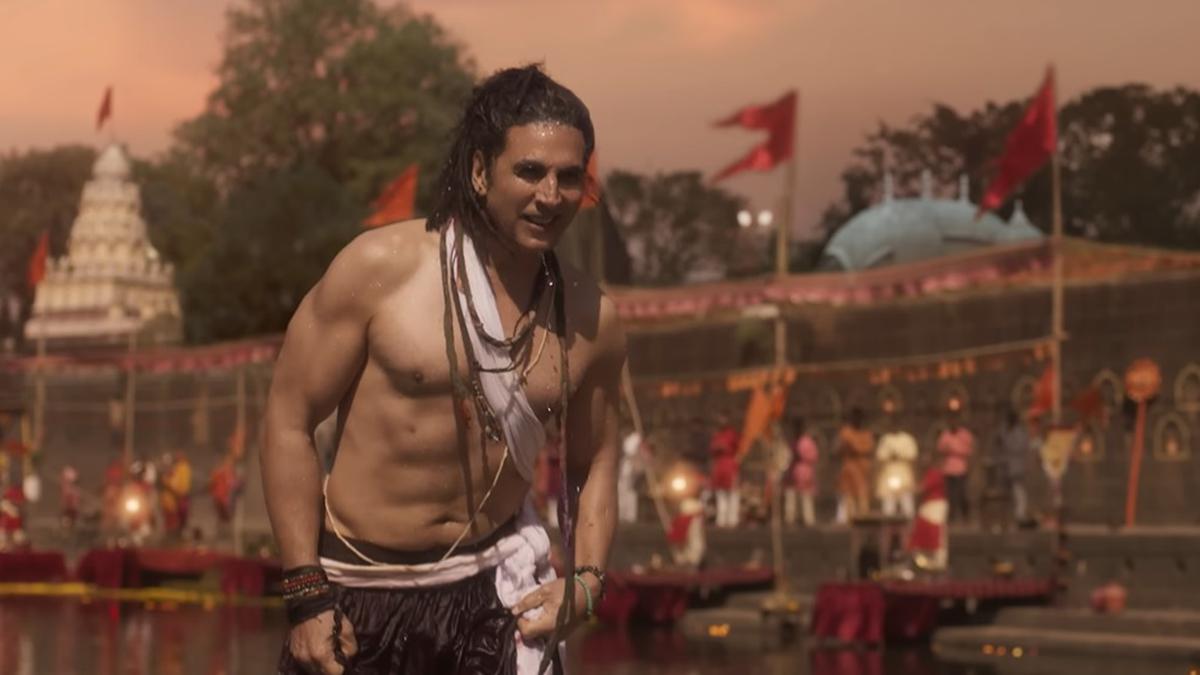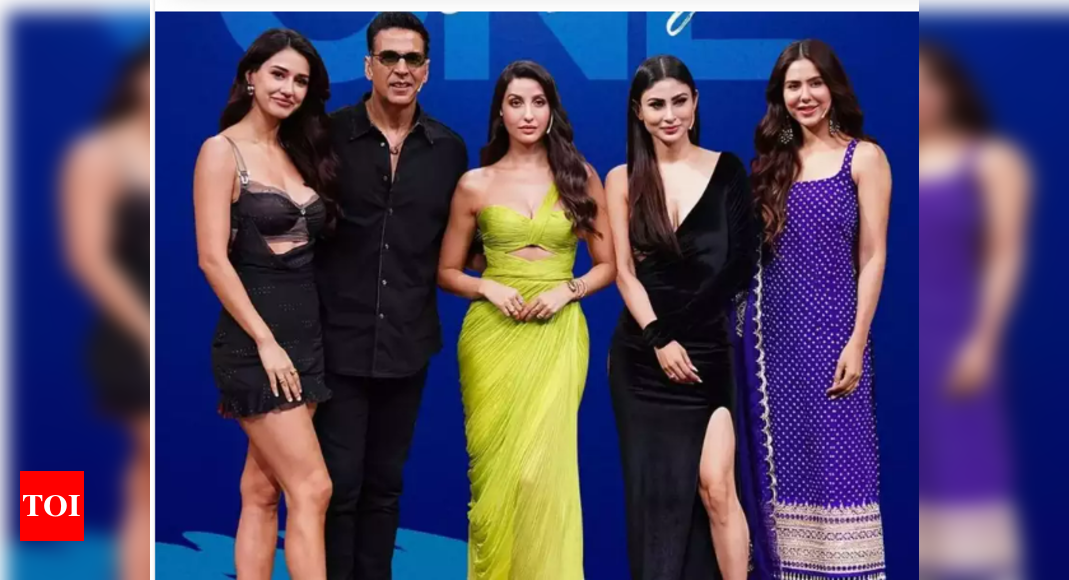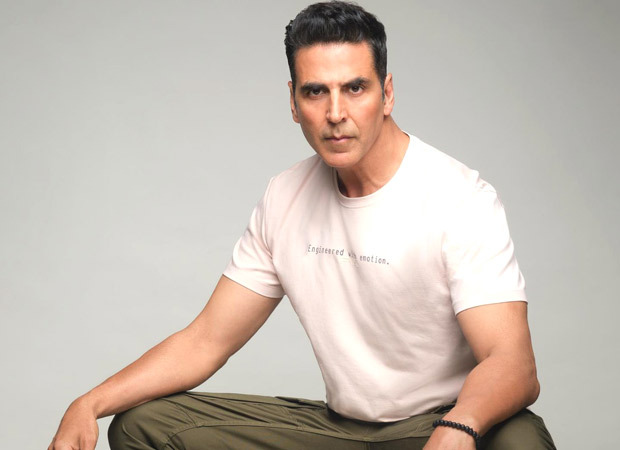Movie Reviews
OMG 2 Movie Review: Akshay Kumar, Pankaj Tripathi and Yami Gautam film entertains and educates
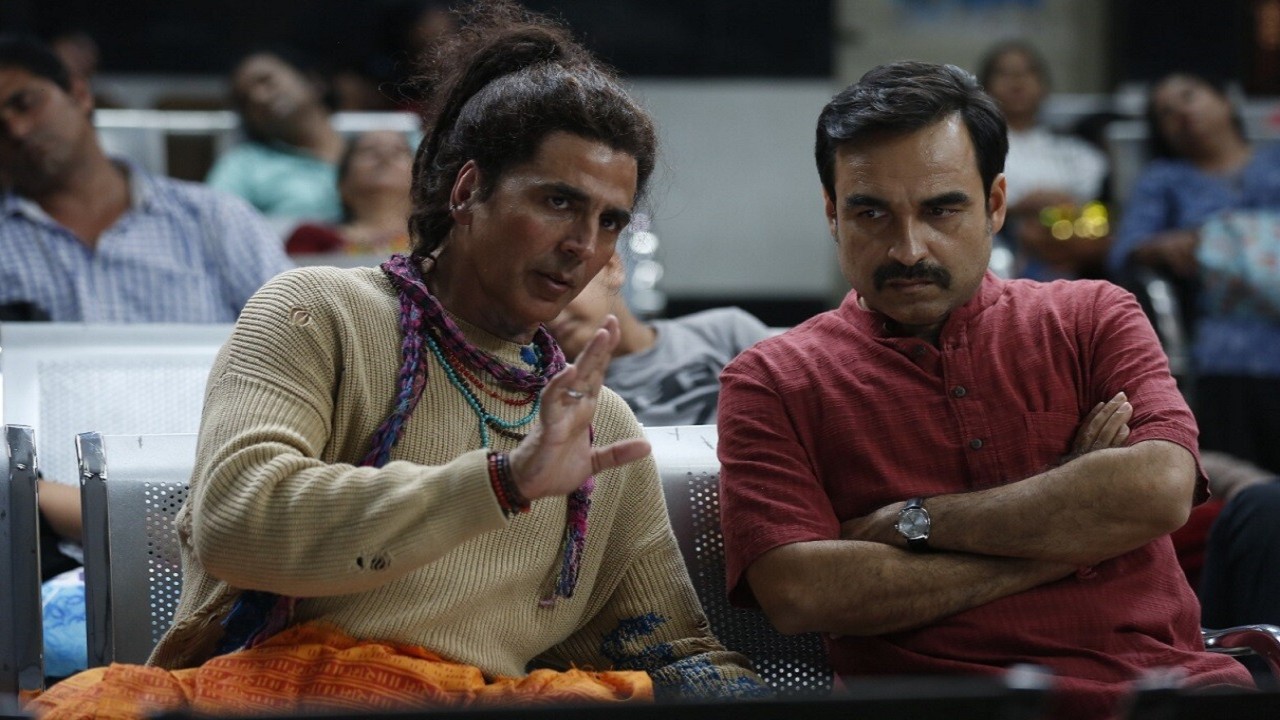
Back in 2012, Akshay Kumar made an appearance as lord Krishna in Oh My God and raised several pertinent questions on societal practices. 11 years later, he is returning with OMG 2, this time making an appearance as Lord Shiva’s messenger. While the first part was led by Paresh Rawal, the sequel features Pankaj Tripathi and Yami Gautam in lead roles.
Plot:
Sex education is a taboo topic in most parts of India and with OMG 2, director Amit Rai tries to put forth a debate around the inclusion of sex education in school syllabus. The plot of OMG 2 revolves around how an episode of masturbation in school takes a toll on the mental health of Vivek (Aarush Varma) and also a change in perception around his entire family in the society. When all hopes and fighting spirit is lost, lord Shiva sends his messenger (Akshay Kumar) to stand by the family in tough times and bring them out of the situation. The messenger motivates his father, Kanti Sharan Mudgal (Pankaj Tripathi) to file a case against the school and several other mis-informants in the society. What’s the case all about and how Kanti Sharan Mudgal manages to break the taboo is what unfolds in OMG 2.
What works?
Credit where due, OMG 2 is making an attempt to put forward a topic which everyone within the industry would shy away from. The team deals with sex education and masturbation with maturity and manages to leave a message but in a very entertaining manner. The story telling is packaged with ample humour and dramatic moments in the courtroom, especially the second half. While the initial 20 minutes are used to set up the story, it picks up with Akshay Kumar’s introduction in the first half and follows a consistent pace until the interval.
There is a little dip in the initial second half, but again, the conflict intensifies and picks up very well in the final 40 minutes. An episode in the pre-climax in the hospital hits the right emotional note and has the potential to have tears roll off your cheeks. That’s followed by another hard-hitting monologue in the climax, which acts as a major clap trap moment, suggesting a sense of victory. There’s another empowering sequence in the climax featuring a sex worker.
All the portions featuring Akshay Kumar are refreshing and bring a smile. Unlike OMG (2012), this one has a unique way in which he helps his believer. In a clash scenario with Gadar 2, there’s a sequence in the second half that’s sure to be received well, acting as an easter egg to what’s happening. The dialogues are done well, especially the comic one-liners through the narrative. The biggest win for OMG lies in the fact that the story makes you feel for what the Vivek, Kanti and family are going through and redeems the belief in the finale.
What Doesn’t Work?
The courtroom sequences in the early part of the case are not as effective as one expected them to be and it takes a little time to warm up to the debate, more so due to the subject that the makers have in hand. Some of the sequences featuring the family in the first half tends to get a little loud on humour front. However, the larger scheme of what the film is trying to say, these drawbacks can be ignored.
The comparisons are bound to happen with the first part, but it is going to be important for the viewers to watch OMG 2 as a standalone film. The topic of OMG was a lot more universal, but this one is a bit more on the taboo side and it’s not easy here to deviate from the conflict for comic relief. The modifications suggested by censor board of certain sequences and dialogues does act as a distraction, especially in the close-up shots. The production values are good enough for the genre of the film.
Performance
Akshay Kumar as lord Shiva’s messenger is integral to the proceedings of story and performances with utmost grace. His screen presence and dialogues never fail to bring a smile, and you can sense a feeling of accomplishment towards the finale. Pankaj Tripathi steals the show with his portrayal of Kanti Sharan Mudgal. He downplays himself in the first half and then rises to the occasion in the second half. He excels in all the monologues while fighting the case, and mouths all those one-liners in his typical poker face style. Yami Gautam as prosecutor Kamini acts well, however, the transformation arc of the character could have been tackled in a better way. Watch out for the confidence with which she fights her case – she carries the confidence in her body language. Child actor Aarush Varma does well in his role, and the same can be said for Pavan Malhotra, who plays a judge. Govind Namdev, Arun Govil, Bijendra Kala do justice to their respective parts. The rest of the ensemble too does well.
Verdict:
OMG 2 is a well-intentioned film that has its heart at the right place. The film educates without getting too preachy. While the courtroom debates could have been a little more exciting, the biggest W for the film is its ability to engage and entertain despite falling in the bracket of a ‘Taboo’. The irony of the situation lies in the fact that the censor board itself fell for the taboo that the film is trying to address and break. OMG 2 is certainly a film that could start some conversations that people are usually awkward to talk about and full marks to the makers for attempting a film on this subject. It’s also commendable for a mainstream movie star like Akshay Kumar to touch upon the subject of Sex Education. Recommended.

Movie Reviews
'Wicked' Review: A Wonderful Bit of Cinematic Wizardry — FilmSpeak

The last time we saw anything Wizard of Oz related on the cinematic stage was more than a decade ago, with Sam Raimi’s often overlooked prequel effort, ‘Oz the Great and Powerful’. What folks have managed to remember about that one, they usually recall between groans and mumble through palmed faces.
That was a film that was, and still is, criticized for lackluster special effects, a suspect cast, and an adhesion to a corny tone that bled into the film’s visuals, as well as impacted the screenplay. Raimi, in accordance with his cinematic character, preferred kinetic camera movements and sharp colors and lighting over other such worries about tonal cohesion and character, at least in that instance.
What’s become odd in retrospect, factoring in the release of the topic at hand, ‘Wicked’, is that the new film struggles with the same issue in a slightly different way. Sure, Wicked’s computer generated elements are cleaner, and much glossier, than anything the world of Oz had to offer in 2013.
But the new film doesn’t just utilize those effects — it relies on them. Wicked has become yet another unintentional bastion for slapping CGI on every single scene, and every little thing. Impressive practical sets here are washed out with brown and grey digital overlays; the sunshine has lost the colorful aura which defines it, and the moon emits only a flat blue hue.
Where is the true middle ground for bringing Oz to life on the visual front, then? That still isn’t clear, but in the case of the newer film, we’ve taken a step in the right direction with many new merits.
Movie Reviews
Wicked movie review & film summary (2024) | Roger Ebert
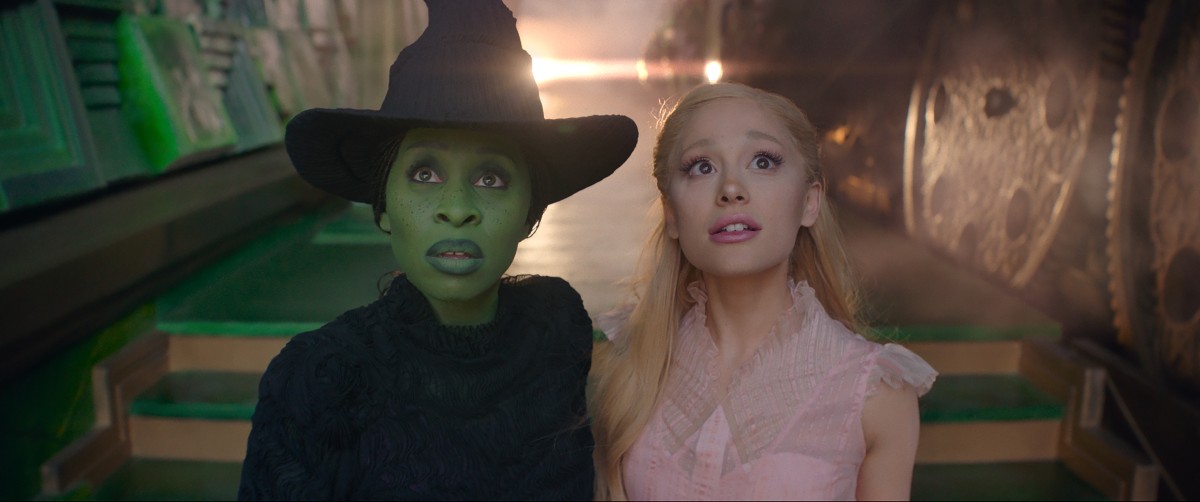
The razzle-dazzle that’s Jon M. Chu’s bread and butter is on glorious display in “Wicked,” the big-screen version of the beloved Broadway musical.
When it’s all about the spectacle of big, splashy production numbers, this prequel to “The Wizard of Oz” is thrilling, whether we’re in Munchkinland, the Emerald City or the campus of Shiz University, where a young Wicked Witch of the West and Glinda the Good Witch of the North first cross paths. As we’ve seen from the director’s previous films including “Crazy Rich Asians” and “In the Heights,” Chu is uniquely adept at presenting an enormous song-and-dance extravaganza without getting lost in it. His sense of pacing and perspective draw us in and center us within the swirling fantasy.
It helps greatly that he has deeply talented stars in Cynthia Erivo and Ariana Grande: magnetic multi-hyphenates who can meet every physical and emotional challenge of these iconic characters. Following in the footsteps of Idina Menzel and Kristin Chenoweth would seem like a daunting task, but Erivo and Grande bring their own vocal power and dramatic interpretation to the roles of Elphaba and Glinda, respectively. You truly feel the friendship between these opposites, particularly in one beautiful, wordless dance sequence where they forge their unlikely bond, which is moving in its understatement. That’s the foundation of this story, so it’s crucial that we know their connection is true for its destruction to be meaningful.
Far less effective is the way Chu, working from a script by Winnie Holzman and Dana Fox, based on the novel by Gregory Maguire, wedges in the movie’s heavier themes of authoritarianism. Yes, they are baked into the story: We know from watching 1939’s “The Wizard of Oz” countless times that the wizard is a con artist who rules by fear. His deception is literally one of smoke and mirrors. That’s all in the source material of the “Wicked” stage production, as well, for which Holzman wrote the book and Stephen Schwartz wrote the music and lyrics. Here, in film form, the tone swings awkwardly between upbeat wonder and dark oppression. This is a world in which minorities are hunted, placed in cages and prevented from speaking, where a charismatic leader (a playfully evil Jeff Goldblum) persecutes a woman of color. It is not subtle, and it feels all-too relevant to our times, despite originating decades ago. It also drags down the energy of this epic tale.
And yet, overstuffed as the film is at 2 hours and 40 minutes, this is only part one: “Wicked” ends where the intermission occurs in the stage show, with part two coming in November 2025. It’s a lot to ask of an audience. Still, people who love this story and these characters will be delighted, and there’s much here for people who aren’t familiar with the musical but are looking for a cinematic escape around the holidays.
“Wicked” begins with Grande’s Glinda descending majestically into Munchkinland to inform her enthusiastic fans that the rumors are true: The witch really is dead. Then it flashes back to how she and the green-hued Elphaba (the Wicked Witch’s first name) became unlikely allies in college. Elphaba has always been bullied and ostracized because of the color of her skin; Glinda—or Galinda, as she’s known at this point—is a pretty, pampered mean girl who’s always gotten her way. (Bowen Yang is a hoot as one of her loyal sycophants.)
But once they’re forced to room together, they eventually realize, to their surprise, that they genuinely see each other in a way no one ever has before. Galinda’s makeover anthem “Popular”—one of the most popular songs from the show—is among the film’s highlights, and a great example of the technical prowess “Wicked” offers. The costume design from Paul Tazewell (“West Side Story”) and production design from longtime Christopher Nolan collaborator Nathan Crowley are exquisite throughout but especially here. Alice Brooks’ cinematography is consistently wondrous, but her use of hot pink lighting as Galinda’s at the height of her power is really evocative.
Chu’s usual choreographer, Christopher Scott, delivers again with vibrant, inspired moves, particularly in the elaborate “Dancing Through Life,” which takes place in the school’s rotating, multilevel library. “Bridgerton” star Jonathan Bailey gets a chance to show off his musical theater background here, and he’s terrifically charming as the glib Prince Fiyero, the object of both Elphaba and Galinda’s romantic interests. Michelle Yeoh brings elegance and just a hint of danger to her role as Madame Morrible, the university’s sorcery professor. And Peter Dinklage lends gravitas as the resonant voice of Dr. Dillamond, a goat instructor who, like other talking animals in Oz, finds himself increasingly in peril.
But it’s that connection between Erivo and Grande that gives the film its emotional heft. Erivo does do much with her eyes to convey Elphaba’s sadness and loneliness and, eventually, her hope and determination. There’s a directness about her screen presence that’s immediate and engaging, and of course she can sing the hell out of these demanding songs. Grande meets her note for note and once again displays her comic chops, but it’s the little choices that make her portrayal of the perfect Galinda feel human: a jerky perkiness that’s slightly dorky. The blonde tresses and array of pink dresses scream confidence, but deep down she’s a try-hard whose desire to be liked is her driving motivation.
As undeniably crowd-pleasing as “Wicked” is in its big moments, these smaller and more intimate details are just as magical.
Movie Reviews
Kishkindha Kaandam Movie Review

The Malayalam film Kishkindha Kaandam, directed by Dinjith Ayyathan, hit theaters on September 12, 2024, and quickly became a box office success, earning over ₹70 crore on a modest ₹7 crore budget. With a stellar cast including Asif Ali, Aparna Balamurali, and Vijayaraghavan, this movie has now begun streaming on OTT platform Disney plus Hotstar. Let’s dive into the Kishkindha Kaandam Movie Review to see what makes it stand out.
Plot Overview
Set in a village bordering a forest, the story revolves around Appu Pillai (Vijayaraghavan), a retired army officer living with his son Ajay Chandra (Asif Ali), daughter-in-law Praveena (Vaishnavi Raj), and grandson Chachu (Aarav). Tragedy strikes when Praveena passes away, and Chachu mysteriously disappears.
While the investigation into Chachu’s disappearance forms a crucial part of the narrative, the police station instructs Appu to surrender his licensed gun due to the upcoming elections. However, the gun has been missing for a long time, complicating matters further. The police warn that even a single missing bullet could lead to serious consequences.
As Ajay remarries Aparna (Aparna Balamurali), she moves into the family home and learns that Appu suffers from memory loss. Aparna grows suspicious of Appu’s behavior, particularly his reluctance to let anyone enter his room and his habit of burning items in a secluded area. Her investigation into Chachu’s disappearance and the missing gun forms the crux of the film.
Analysis
Kishkindha Kaandam revolves around three key characters: the father, the son, and the daughter-in-law. Aparna’s desire to find Chachu and bring happiness back to her family drives the first half of the movie. As she uncovers clues linking Appu to Chachu’s disappearance and the missing gun, the tension escalates in the second half.
The narrative cleverly intertwines memory loss, a missing gun, and a child’s disappearance, keeping the audience guessing until the very end. The film’s strength lies in its minimalist approach, focusing on a small cast and localized settings. The title, Kishkindha Kaandam, reflects the village’s unique connection to monkeys, adding a symbolic layer to the plot.
Director Dinjith Ayyathan skillfully maintains suspense without relying on exaggerated drama, keeping the story grounded in realism. This approach makes the twists and turns feel natural and engaging.
Performances
Vijayaraghavan delivers a standout performance as the enigmatic and suspicious Appu Pillai. His portrayal of a man struggling with memory loss while harboring secrets is both compelling and nuanced. Asif Ali shines as Ajay, caught between family responsibilities and professional duties. Aparna Balamurali impresses with her natural acting, convincingly portraying a new bride navigating the complexities of her new family while trying to uncover the truth.
Technical Aspects
Cinematography: Ramesh’s visuals beautifully capture the lush, forested village, enhancing the story’s atmosphere.
Music: Mujeeb Majeed’s haunting background score elevates the suspense.
Editing: Suraj’s crisp editing ensures a tight narrative, particularly in the second half.
Malayalam cinema continues its tradition of seamlessly integrating stories with authentic locations, making the events on screen feel believable and immersive.
Verdict
Kishkindha Kaandam is a captivating mystery thriller with strong performances, a well-crafted screenplay, and stunning visuals. It’s a testament to the power of storytelling and naturalistic filmmaking. This is a movie that can be enjoyed with the whole family.
-

 News1 week ago
News1 week agoHerbert Smith Freehills to merge with US-based law firm Kramer Levin
-
/cdn.vox-cdn.com/uploads/chorus_asset/file/25724877/Super_Nintendo_World.png)
/cdn.vox-cdn.com/uploads/chorus_asset/file/25724877/Super_Nintendo_World.png) Technology1 week ago
Technology1 week agoThe next Nintendo Direct is all about Super Nintendo World’s Donkey Kong Country
-
Business7 days ago
Column: OpenAI just scored a huge victory in a copyright case … or did it?
-

 Health7 days ago
Health7 days agoBird flu leaves teen in critical condition after country's first reported case
-

 Business3 days ago
Business3 days agoColumn: Molly White's message for journalists going freelance — be ready for the pitfalls
-
Politics1 week ago
Editorial: Abortion was on ballots across the country in this election. The results are encouraging
-
World1 week ago
Sarah Palin, NY Times Have Explored Settlement, as Judge Sets Defamation Retrial
-

 Politics2 days ago
Politics2 days agoTrump taps FCC member Brendan Carr to lead agency: 'Warrior for Free Speech'
